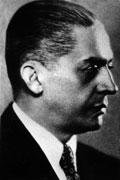Educated as lawyer at the Free Faculty of Law in Minas Gerais (graduated in 1915), Carlos Coimbra da Luz worked as public prosecutor at Leopoldina, a city where he served as prefect (mayor) in 1923-1932. He occupied the offices of secretary for agriculture, transportation and public works (1932-1933), and secretary for the interior (1933-1935) in the government of Minas Gerais (1932-1933). Elected on the list of the Progressive Party of Minas Gerais (Partido Progressista de Minas Gerais), Luz was a federal deputy (1935-1937) and parliamentary majority leader (1937), but his term was interrupted when the Congress was dissolved (11 Nov 1937) in the course of the coup directed by President Getúlio Dorneles Vargas. In the years of Vargas's authoritarian rule (Estado Novo), Luz chaired the Federal Savings Bank in Rio de Janeiro (1939-1946). As a candidate of the Social Democratic Party (Partido Social Democrático), he was elected (2 Dec 1945) deputy of the Constituent Assembly, but did not take his seat as he was appointed justice and interior minister (31 Jan 1946 - 2 Oct 1946) in the government of Eurico Gaspar Dutra. He quit the ministry after eight months of work and resumed his mandate in the Chamber of Deputies (1947-1961). As President of the Chamber of Deputies (2 Feb 1955 - 14 Nov 1955) [1], Luz twice served as legal substitute for the President of the Republic according to the terms of the Constitution of 1946. For the first time he briefly assumed the presidency in April 1955 when President João Café Filho was absent on a state visit to Portugal. On 8 Nov 1955 Café Filho, hospitalized after a stroke, delegated presidential authority to Luz as his legal substitute in case of incapacity. In response to the attempt of Luz to dismiss war minister Henrique Teixeira Lott (9 Nov 1955), the army leadership mobilized troops in Rio de Janeiro and provinces. Luz and some ministers took refuge on board of cruiser Tamandaré, from where he was trying to organize resistance to the army movement. The Chamber of Deputies and Senate, called for an extraordinary session, recognized the existence of impediment for discharge of functions by Café Filho and Luz (11 Nov 1955). The Congress transferred the presidency to Nereu de Oliveira Ramos, Vice President of the Federal Senate. While the ship was on its way to Santos, Luz learned that he would not be allowed to disembark. It was then planned to reverse course and sail to Salvador, but ultimately Luz decided to return to Rio de Janeiro, where he landed on 14 Nov 1955, and submitted his resignation as President of the Chamber of Deputies, which was accepted on that day. He remained an active member of the Chamber, however. [2] |

